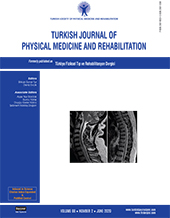The efficacy of transcutaneous electrical nerve stimulation therapy in pain control after cesarean section delivery associated with uterine contractions and abdominal incision
2 Department of Physical Medicine and Rehabilitation, University of Health Sciences, Bursa Yüksek Ihtisas Training and Research Hospital, Bursa, Turkey
3 Department of Physical Medicine and Rehabilitation, Uludağ University School of Medicine, Bursa, Turkey DOI : 10.5606/tftrd.2020.3225 Objectives: This study aims to investigate the effects of transcutaneous electrical nerve stimulation (TENS) therapy on the intensity of pain associated with uterine contractions and abdominal incision in patients undergoing cesarean section (C-section) delivery.
Patients and methods: This single-blind, prospective, randomized-controlled study included a total of 90 female patients (mean age 30.5 years; range, 25 to 36 years) who had a scheduled C-section delivery between November 2017 and April 2018. Forty-five postpartum patients were randomly assigned into the treatment group (Group 1) and TENS electrodes were placed below and above the abdominal incision. The control group (n=45) consisted of 45 patients who had a scheduled C-section (Group 2) (n=45) and received routine follow-up care. The Visual Numeric Scale (VNS) scores were obtained separately for abdominal, low back, and groin pain at baseline (within 1 h after C-section before the TENS replacement), at postpartum 2, 6, 24, and 48 h. In addition to instant scoring, the percentages of change in pain scores from baseline were also calculated for each time points.
Results: Data of a total of 87 patients were analyzed. No statistically significant difference was found in the baseline VNS scores measured in any body regions between the groups (p>0.05). However, there was a statistically significant difference in the instant VNS scores for abdominal pain at 2, 6, 24, and 48 h in favor of Group 1 (p<0.05). No significant differences were found in the instant VNS scores for low back and groin pain (p>0.05). The comparison of changes in pain scores from baseline (% change) over time between the groups revealed a statistically significant difference in favor of Group 1 in all VNS scores for abdominal, low back, and groin pain at 2, 6, 24, and 48 h (p<0.05).
Conclusion: Our study results suggest that TENS is an effective and safe non-invasive, non-pharmacological treatment modality. It may be preferred as an alternative method in pain control in postpartum women after C-section delivery.
Keywords : Analgesia, cesarean section, pain control, transcutaneous electrical nerve stimulation
















